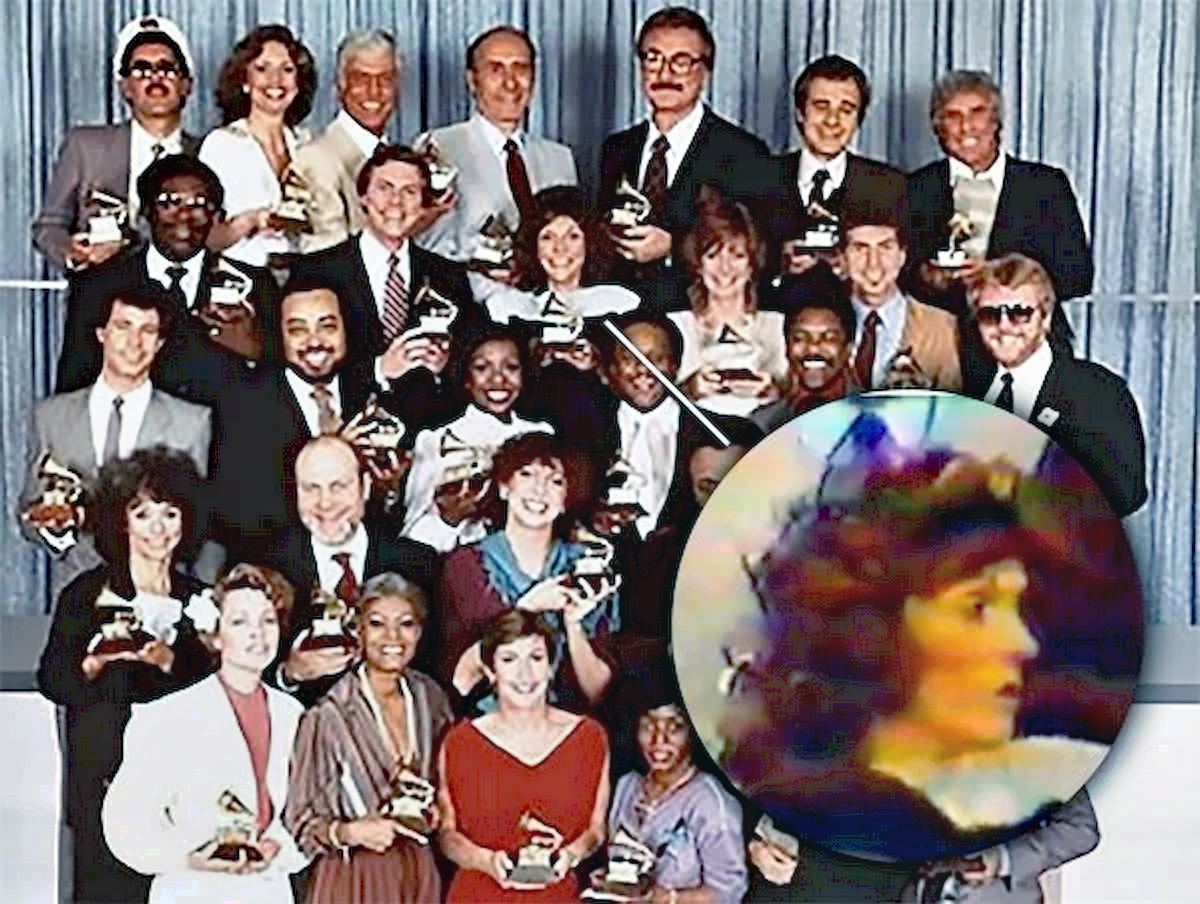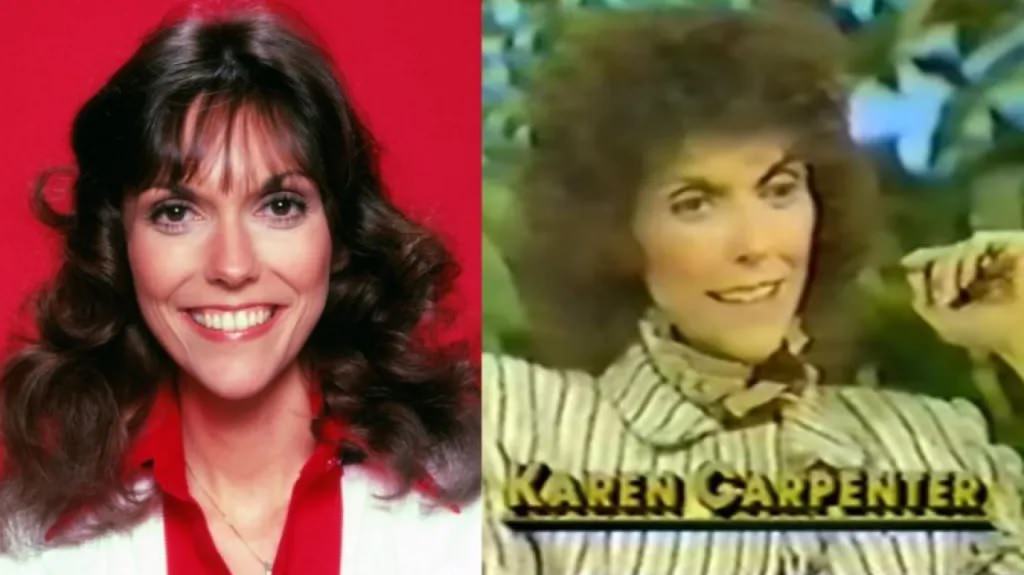Karen Carpenter was one of the most iconic singers of the 1970s, known for her smooth, melodic voice and heartfelt lyrics. Unfortunately, her life was cut tragically short when she died on February 4, 1983, at the age of just 32.
Carpenter’s last public appearance was just weeks before her death, at a promotional photo shoot for the 25th annual Grammy Awards. The photo, taken on January 11, 1983, shows Carpenter looking thin and frail, leading many to speculate about her health.

In the years leading up to her death, Carpenter had struggled with anorexia nervosa, a serious eating disorder that can have severe physical and psychological effects. She had sought treatment for the disorder, but it had taken a toll on her body and her career. Carpenter’s weight loss had become increasingly noticeable to her fans, and her struggles with anorexia had become a public topic of conversation.

After Carpenter’s death, the music world was left reeling. Her music had been a staple of the airwaves for years, and her untimely passing was a shock to her many fans. Despite the sadness of her passing, however, Carpenter’s legacy continued to grow in the years that followed. Her songs continued to be popular on the radio and in films, and her music videos were frequently played on MTV. Her voice, once again, captured the hearts of listeners around the world.
In addition to her musical legacy, Carpenter’s death also drew attention to the issue of anorexia nervosa and other eating disorders. Her struggles with the disorder had been well-documented, and her death helped to raise awareness of the serious health risks associated with these conditions.
The Karen Carpenter Foundation, established in 1985 by Carpenter’s brother, Richard, has been a driving force in promoting awareness of anorexia nervosa and other eating disorders. The foundation provides information and resources to help those struggling with these disorders, and works to promote research into their causes and treatments.
Carpenter’s life and music continue to be celebrated today, nearly 40 years after her death. Her songs, including “Close to You,” “Rainy Days and Mondays,” and “We’ve Only Just Begun,” remain classics of the era, and her legacy as a singer and songwriter lives on. She is remembered not only for her talent, but also for her bravery in sharing her struggles with anorexia with the world.
Karen Carpenter’s death was a tragedy that had a profound impact on the music world and on the broader public consciousness. Her last photo, taken just weeks before her death, has become an iconic image of her struggles with anorexia and of the toll the disorder can take on a person’s health. Despite the sadness of her passing, however, Carpenter’s legacy has continued to grow in the decades since her death, as her music and her message continue to inspire new generations of listeners.



Karen Carpenter was one of the clearest voices in the industry. It is so sad that she passed away at such a young age.
Anorexia and bulimia
Her death shed light on anorexia as a serious and widespread medical condition. It became okay to talk about it openly, and so treatment began.
It wasn’t understood back then, in the early 1980s.
Her bio mentioned she went to an expensive therapist in NYC, as a last ditch effort, and one of the sessions included wearing a bikini in a mirror and assessing how she looked
You’re joking right?
Wow. The history of therapy is dark, and it has only improved marginally
Your therapist’s training and understanding of modern practices are definitely important factors. The person you are putting your trust in, really, must be a health care worker.
Here’s the quote “Returning to Levenkron the following day, Karen was asked to change into the bikini and stand in front of the office mirror. He urged her to survey and evaluate her body. “She didn’t really see any problem with how she looked,” Itchie [a friend] recalls. “In fact, she thought she was gaining a little weight. But she was seventy-nine pounds. That was one of the times where I would go home and lock myself in my bathroom and cry.”
It’s so messed up. The complete opposite of help. The worst thing you can do to someone with an eating disorder is to make them do this.
Back then, people didn’t know that, but now we know. In the early 1990s, we thought telling our anorexic high school classmate to gain weight was “helpful”. Perhaps we just exacerbated her fixation. It’s still unclear to me what we could have done to help.
What a voice; what a waste.
Sadly, I believe she was so far along with her illness that she probably wasn’t even aware of the damage she was causing. In the end, she passed away.
Is that Harry Nilsson, second row, all the way to the right?
Although I’m not a fan of The Carpenters’ music, I absolutely adore her voice. It’s just perfect.
I hated vinyl records because my mom used to play the shit out of them when I was a kid. I have learned to appreciate them over the years, and think she had one of the most beautiful voices ever recorded.
I read that her heart had been damaged by taking ipecac syrup in order to induce vomiting in order to lose weight. Since she was eating more again, she thought she could get away with doing that. In the end, the long-term damage to the heart led to its failure.
When you run out of body fat to burn, it then turns on the muscles. This includes the heart. Karen Carpenter and Elvis are probably the earliest celebrity deaths I remember. Despite completely opposite types of abuse, the outcome is the same.
Yes, I know, having been anorexic (sometimes bulimic, and using ipecac) for twenty years. People couldn’t believe that I hadn’t died in that time, and my family was told to purchase a burial plot. Fortunately, I was able to quickly and fully recover after those 20 years.
The autopsy did show emetine toxicity(abuse of substances to induce vomiting). So there was some use of Ipecac or other vomit inducing substance. Fun fact, Ipecac is in the same family as the poison Ricin(made popular on the show Breaking Bad)
It’s sad she passed from starvation.
I feel so sorry that she felt she had to do these things to be loved or to feel valuable. Her mother drove her to do this, wasn’t it?
Based on the movie, it was her mother (not demonstrative; seemed to favor Richard) AND Richard (seemed to hold her back at times). However, I don’t like to speculate. Regardless of the cause, she felt she had little control over her life, and her eating disorder/weight was something she could control
In my opinion, she is one of the most tragic victims of fame.
Karen, however, is not a celebrity and suffers the same struggles few people are aware of that few celebrities do. Somehow, I feel more sympathy for those who have 20 friends than those who have a million followers.
Karen Carpenter was a very famous singer prior to her untimely death. She was on stage and scrutinized at a time where everyone wanted to look like the model Twiggy and no one wanted to look like Mama Cass.
I don’t know that this had a lot to do with fame at all.
Her anorexia was not just caused by fame, but also by perceived pressure to be thin. Fame exacerbated all of that. My understanding at the time was that she probably wouldn’t have felt nearly as much pressure if she had lived a “normal” life, so I’m not sure fame had a major impact on her.
During a therapy session, the doctor wanted the family to tell her how much they loved her… but her mother refused and didn’t say anything.
Although I won’t speculate on the mitigating factors for her eating disorder, I will say that there is something about Richard that I never liked. I feel very uneasy just looking at him, as if something is hidden. I wouldn’t want to be locked in a room with him, and I’m a guy.